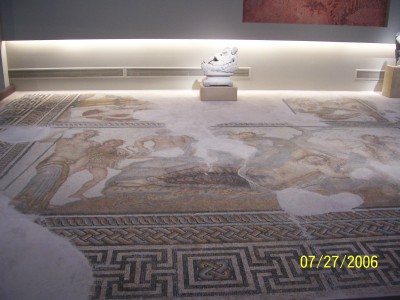In the midst of Paul's letter to the Thessalonians, he
condemns sexual immorality:
For this is the will of God, your sanctification: that you
abstain from sexual immorality (lit: porn); that each one of you
know how to control your own body in holiness and honor, not
with lustful passion, like the gentiles who do not know God;
(1st Letter to the Thessalonians, chapter 4:3-5)
It is important to recognize that Paul's problem was not merely sex but the prostitution and
sexual worship that permeated his day.
First, elsewhere in Paul's letters, Paul does not discourage
sexual relations between husband and wife (1 Corinthians,
chapter 7).
Second, the word Paul uses in his letter to the Thessalonians
here is NOT sex (or even fornication) but rather p-o-r-n-i-a.
This covers a range of actions including prostitution. (Martin
Luther's original German translation even used the word
prostitution here). Prostitution was not nearly as taboo then as
it is today. At Corinth, for example, the temple of Aphrodite
had 1,000 temple prostitutes!
Third, Thessaloniki was into pagan worship. A lot of these
rituals involved alcohol and sex. In Dionysian worship, sex
involved a loss of control, a complete domination of one by
one's passions. (Again, see Dionysos
Tablet in Corinth. for more information; or do a google
search!) Perhaps this why Paul here admonishes them to have
control.
At some level, this passage of Paul could be seen as
oppressive; another condemnation of sex. However, if understood
properly, this verse actually gives freedom. Paul does not want
anyone to think that the Christian God needs us to have sex to
have communion with God. Paul also does not want people to be
overcome by their own lusts, trapped in addictions.
sources:
info on thessaloniki: Tambasco, Anthony.
In the Day of Paul: The Social World and Teaching of the
Apostle. Paulist Press: New York, 1991.
info on prostitutes: http://www.sacred-destinations.com/greece/corinth.htm
info on greek words: Bauer, Walter.
Greek-English Lexicon of the New Testament and Other Early
Christian Literature. ed. by Danker, Arndt, Gingrich, 3rd ed.
Chicago: University of Chicago Press, 2000, available through
Bible Works.



 This
mosaic depicts the arrival of Dionysos, the god of wine in
Greek mythology.
Dionysos is also associated with the harvest and fertility
rituals.
This
mosaic depicts the arrival of Dionysos, the god of wine in
Greek mythology.
Dionysos is also associated with the harvest and fertility
rituals.